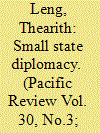| Srl | Item |
| 1 |
ID:
152093


|
|
|
|
|
| Summary/Abstract |
Cambodia's foreign policy behavior towards Vietnam can be characterized as using a strategy of ‘hedging’, whose nature is different from the one suggested in the existing literature. Such a strategy can be discerned from Cambodia's omni-directional policy responses, ranging from economic pragmatism, limited bandwagoning, binding engagement and soft-balancing. Furthermore, the case of Cambodia's foreign policy towards Vietnam suggests that non-state actors, such as the opposition party and the population (voters) play a significant role in shaping the state's foreign policy, even though it is formed under the authoritarian ruling party. This study also suggests that the foreign policy decisions of an authoritarian state are not solely shaped by the personal attributes of their leader.
|
|
|
|
|
|
|
|
|
|
|
|
|
|
|
|
| 2 |
ID:
170697


|
|
|
|
|
| Summary/Abstract |
This article examines Cambodia’s backing of China’s Belt and Road Initiative (BRI). Having explored bilateral historical ties, the author concludes that Cambodia has pursued a bandwagoning policy with China for most of its post-colonial period since 1953. At present, Cambodia’s bandwagoning policy with China has been manifested in the former’s support of the latter’s initiative. It begs a question as to why the kingdom has enthusiastically supported it. The article elucidates the motives behind Cambodia’s bandwagoning policy on BRI applying John Spanier’s three level of analytical framework. First, on the systemic level, it argues that China’s bid to expand its influence, the change of balance of power in Southeast Asia, and the clean competition for influence between China and Japan in the Mekong Region have affected Cambodia’s policy decision on the BRI. Second, at the nation-state level of analysis, Cambodia perceives BRI as another funding source of infrastructure projects, and a means to achieve its policy goal of becoming an economic hub in the region and to whip up domestic support of the ruling party. Finally, on the decision-making level, the backing of the BRI may stem from Prime Minister Hun Sen’s pragmatic views of how to sustain his rule over the country. He might have viewed that economic growth would help to strengthen his ruling. The analysis concludes by identifying some negative repercussions Cambodia has encountered as a result of her support of the BRI.
|
|
|
|
|
|
|
|
|
|
|
|
|
|
|
|